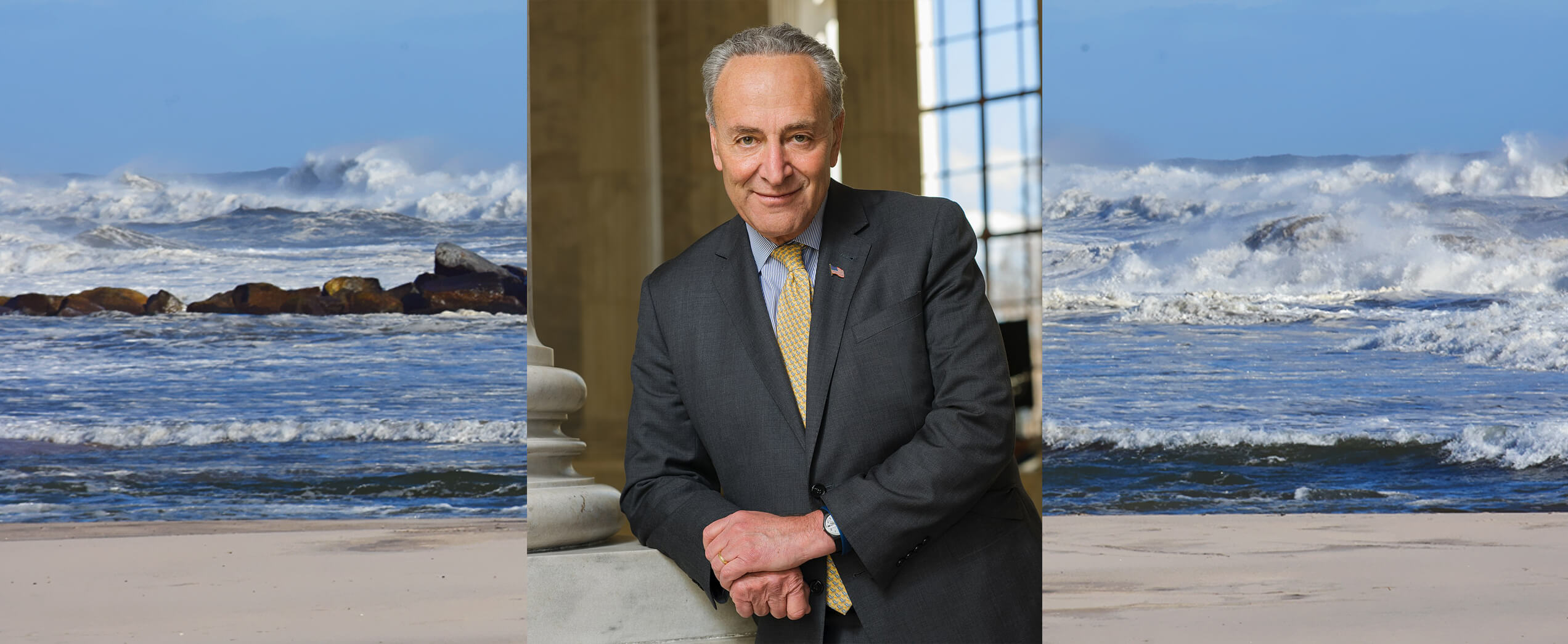Schumer Cuts Through The Red Tape

Georgica is a lot more than a nesting ground for the world’s rich and famous A-listers. The pond that bears its name is also a prime spot for locals and visitors alike—canoeists, crabbers, sailors, and ice skaters.
The picturesque pond is a beloved East Hampton icon, but besieged by the changing face of the environment, it is in a fight for its survival.
This week U.S. Senator Chuck Schumer announced he has brokered an agreement that will help secure Georgica Pond’s fragile health, though many hurdles remain.
The beleaguered pond is a constant cause of concern. One thing is for certain: the semi-annual flushing—emptying the pond into the Atlantic—is the most critical lifeline it has. Without the cleansing and influx of saltwater, the pond would not survive.
It used to be a rather simple process: The East Hampton Town Trustees would decide when in the spring to open up Georgica Pond, and do so again in the fall. Nowadays, a variety of permits and approvals are needed. To make matters worse, the shoreline can’t be disturbed during piping plover nesting season, which begins in early spring.
Last spring, the town trustees missed the narrow window available for the letting, and the pond suffered enormously. The Army Corps of Engineers, often a difficult agency to work with from the town’s perspective, needed to sign off on the permit approval every year.
The East Hampton Town Trustees have managed the pond for more than 300 years. Beach sand has built shoals impeding that exchange, threatening the marine life in the pond. After missing the window to open the pond in the spring tempers flared in some quarters. “There was a lot of frustration,” said Sara Davison, executive director, Friends of Georgica Pond Foundation. “Because federal agencies were involved, we reached out to the senator.”
That’s where Schumer came in. He noted that last year algae levels rose in the pond and flooding occurred because the dredging and letting wasn’t completed. He called the process, “bureaucratic & inefficient” and decided to intervene.
The Corps signing off on a new 10-year permit ahead of piping plover season, “is just what the doctor ordered for Georgica Pond and those who live near it,” Schumer said.
“After working in conjunction with the Army Corps of Engineers, the East Hampton Town Trustees, U.S. Fish & Wildlife Service, and the New York State Department of Environmental Conservation to secure this 10-year permit, I consider this a major victory for the East Hampton community and, more importantly, the local wildlife that depends on Georgica Pond,” Schumer told The Independent last Thursday.
“We’re thrilled,” said Davison. “We hope we can pull it off before the plovers get settled [in the spring].”
Flushing, as effective as it is, isn’t a cure-all for the pond’s malaise, Davison noted.
“This is just one of the many remedies needed,” Davison said. She explained that nitrogen and phosphorus flowing from septic systems into the pond eventually choke it, starving it of oxygen and creating “dead zones.”
Dr. Christopher Gobler of the Stony Brook Marine Department has done extensive research on behalf of the foundation.
The Friends of Georgica Pond Foundation, through partnerships, has initiated a number of Gobler’s suggestions advanced to help control the problem. An aquatic weed harvester that removes vegetation from the bottom of the pond is currently in operation, a permeable reactive barrier that will intercept harmful runoff is being developed and may someday be installed around the entire pond.
The 75 residents who live on the shore of the pond are gearing up to install new state of the art septic systems. One has already been installed, two are in the permitting process, and many others “are getting up and running,” Davison said.
“Georgica Pond, at approximately 290 acres, is one of the jewels of East Hampton, providing the residents beauty and sport, as well as livelihoods for traditional bay men,” said Francis Bock, clerk, East Hampton Trustees.
“Senator Schumer has recognized the value of Georgica Pond to our community, as well as the time sensitive need to dredge the shoals. Navigating the various permits that are required for environmental projects can be daunting and time consuming. The outstanding assistance of the senator and his staff to secure this permit is greatly appreciated,” Bock said.
Schumer said securing the permits was, “a win-win-win for environment, plovers, and local residents.”
Davison said State Assemblyman Fred Thiele also worked hard to cut through some of the red tape.



